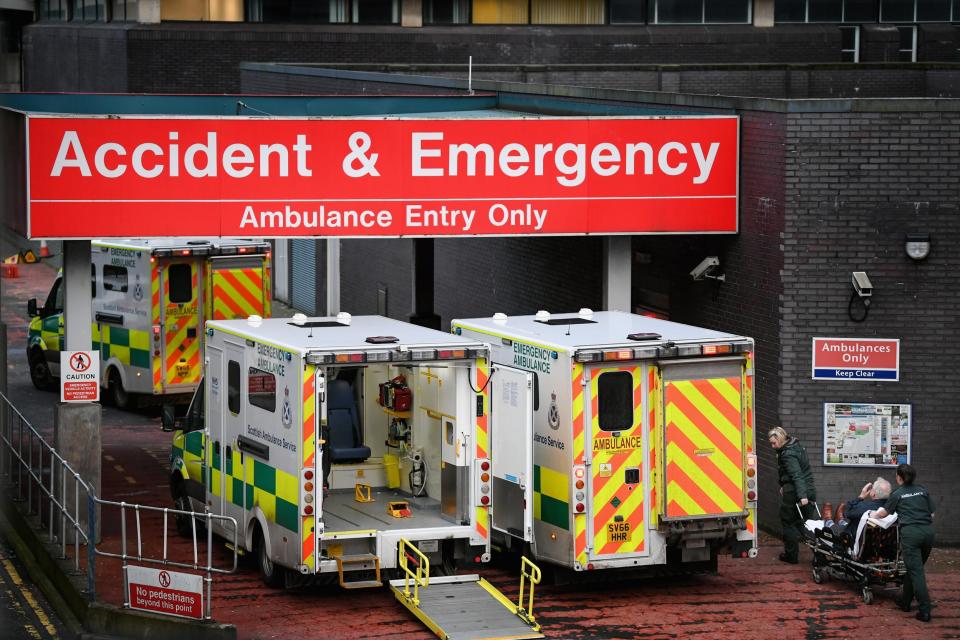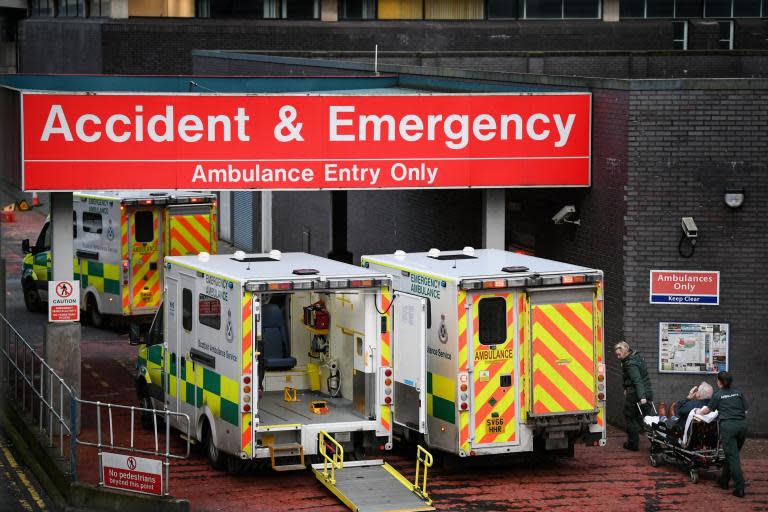NHS winter crisis officially worst on record and patients still suffering, final figures show
“Heroic” NHS staff weathered the worst winter on record as official figures reveal patient waiting times, bed shortages and ambulance queues hit unprecedented levels.
The statistics fly in the face of Prime Minister Theresa May’s claim that the NHS “was better prepared for winter than ever before” and experts say last-minute funding injections can no longer keep services running in the face of years of austerity.
The final winter analysis, compiled by Labour and verified by the House of Commons Library, takes in every year of available weekly data published by NHS England back to 2011-2012.
It reveals patient care suffered on an unprecedented scale and comes in the same week that academics called for a review after a shocking jump in the death rates this winter, with 10,000 additional deaths in the first seven weeks of 2018.
Hundreds of thousands of patients were forced to wait in corridors and ambulances while hospitals scrambled to find space for patients.
Between December 2017 and February 2018 a record 163,298 patients waited more than half an hour to be handed over to A&E departments.
This is three times higher than in 2013-14, when 54,463 patients were kept waiting.
Hospitals had just 97,897 beds open, on average, at any point over this winter – the lowest number on record and 2,500 fewer than in 2015.
Critics said bed shortages make a winter crisis almost an inevitability, as it denies hospitals of reserve capacity when patients can’t be discharged at weekends and overnight.
Dr Chris Moulton, a consultant at the Royal Bolton Hospital and vice-president of the Royal College of Emergency Medicine, told The Independent: “You need beds to give you flexibility, and reduce your infection rate, and to give you a bit of holding time”.
“We’ve got the least beds in the developed world, we need more, as well as more staff and funding for social care. There is no easy way round that.”
Labour is calling for an “urgent enquiry” into how preparations this year fell so far short, and for an apology for chronic underfunding that has harmed patients and heaped pressure on staff.
“Our new analysis today confirms the Government has let down patients on a record scale, despite the heroic efforts of our brilliant NHS staff battling through wind and snow to provide the best possible care,” said Shadow Health Secretary Jonathan Ashworth.
“The public deserves nothing less than a government guarantee that patients will never have to suffer on this same scale ever again.”
Theresa May has already apologised once this winter, for the disruption suffered by thousands of patients who had planned operations and non-urgent appointments cancelled en masse on the advice of health service officials.
This, another never before seen planning measure, was intended to free up space on the front line when it was announced at the start of January, but its long-term effect is to push pressure down the road.
Other planning measures included a £1bn investment for social care in the Spring Statement to allow patients to be sent home swiftly when they’re fit and new rules for ambulances to prevent queues at A&E, neither of which appear to have worked sufficiently.
The queues of ambulances outside hospitals didn’t only impact the care of their patient passengers, but mean the ambulance and its crew are off the road.
Over Christmas, The Independent revealed these delays had resulted in nurses being drafted in as first responders after a shortage of paramedics meant pensioners waiting hours on the floor with broken bones.
A whistleblower in the East of England Ambulance Service Trust said there had been 20 deaths and at least the same number seriously injured as a result of ambulance delays over Christmas.
This included the allegation of a patient freezing to death on 27 December after a 16-hour ambulance wait. The trust is currently reviewing winter performance.
But the delays are down to a lack of bed space in hospitals, and this in turn can be traced to inadequate funding for social care, meaning there is no where patients can be sent safely.
“The figures are of no surprise at all to us on the front line,” Dr Nick Scriven, a consultant in acute medicine in Halifax Hospital and president of the Society for Acute Medicine, told The Independent.
“With the constant reduction in acute beds, every winter has been getting progressively worse in the NHS and this year the flu surge brought it to its knees.
“This is without a doubt worse than last winter. There is no let up at all and nothing will realistically change until after the Easter bank holiday”.
The Department of Health said its investment in social care had meant just 45,000 patients were delayed in hospital when they were fit to be sent home in January.
That’s less than one-third of the previous year, and while performance against targets had continued to decline this was down to spiralling patient demand.
A spokesperson added: “This analysis presents an incomplete picture – whilst the NHS has been extremely busy this winter, compared to last year our hardworking staff still managed to see 1,800 more patients a day within the four-hour A&E target and reduce the number of people stuck in hospital unnecessarily.
“We know there is more to do, which is why the Government gave the NHS top priority in the recent Budget with an extra £2.8bn allocated over the next two years.”
The health service needs an extra £4bn next year to maintain services, but it will receive less than half of that and health service leaders say the Government is establishing a pattern of offering too little, too late.
“The £335m to address winter pressures in last year’s Budget was provided too late in the day and proved a short-term sticking plaster that failed to meet the demands of the NHS’s most challenging season,” Dr Chaand Nagpaul, chair of the British Medical Association, told The Independent.
“The appalling scenes witnessed in hospitals throughout the country in the past few months – as well as heightened pressure on GP services – have become an annual event, stretching further and further into the year each time."
The full cost is unknown.
An editorial in the BMJ this week said the Government must review why deaths in the first seven weeks of 2018 were 12.4 per cent higher than the average from the last five years – 93,990 deaths compared to 83,615.
Meanwhile, thousands of patients have had joint replacements and other operations pushed back for months leaving them in pain and worrying about their health.
But experts say it is more worrying to think of the near miss they represent if less drastic measures had been taken.
“It needs to be looked into,” Professor Danny Dorling of Oxford University told The Independent.
“Because if it’s true that failing to cancel appointments would have meant more deaths, then it’s even more serious.
“When numerous things in society are going wrong, you reach a crunch point in winter, regardless of temperature or flu, in the NHS.”

 Yahoo News
Yahoo News 

